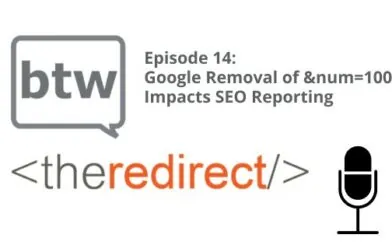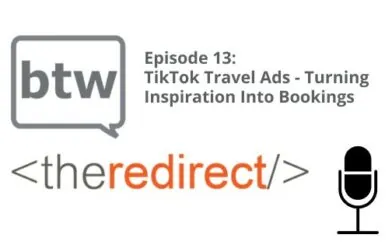Episode 28 / January 5, 2018
Listen now:
In this episode of The Redirect Podcast, we discuss what voice search looks like for 2018, including current shortcomings, the impending growth of advertising with Amazon Alexa with ads focusing on sponsorships or buyer purchase history, and how online reviews tie in with voice search.
Voice Search: A Skeptic’s View of the Present
In last week’s podcast, I (Patrick) made a prediction that voice search will fizzle out, and I caught some flack for it. This week, I ask: “Okay, you did a voice search. Now what?”
Everything we industry professionals keep reading about is accuracy, functionality, usability, adoption rates, command quality, instruction uniformity, which then ultimately leads into the conversation of Google vs. Amazon, and that Apple gets an A for effort.
But as search marketers, then what? What for? A document Google released last month with evaluation guidelines for speech search gives ratings and analysis on what is working. It’s full of not-helpful examples like “How tall was Charles Darwin?” and “How far is Alpha Centauri from the sun?” (4.367 light years, FYI). Why do we search marketers care? I (Patrick) have been an SEO for 5+ years. Queries like that have never been relevant. This reminds me of the days when Siri first came out and people kept asking her what she’s wearing (OMG guys, she’s so sassy!). This doesn’t help me.
When a voice search can help me review features on that Glastron boat against the features on the Scarab boat, then I’ll get excited. When voice search can help me analyze what local dermatologist I want to send my daughter to based on the reviews left on several review platforms, then I’ll start paying closer attention. But in the meantime, if I want to know what the weather is like in Michigan’s Upper Peninsula, I’ll just ask my phone.
I read an article about doing mobile SEO for voice search right, and you know what it told me? Do what we already do. That’s right: secure sites, mobile friendly sites with good schema mark-up, with well thought-out titles, descriptions, and maybe even featured snippets, with content that is relevant to an end user and not full of proprietary words that don’t tell a user what it is.
The article stated that, according to Bright Edge, it’s predicted that 66% of marketers have no plans specific to voice search for 2018. I challenge that and say that they do – because it’s seamless with their regular marketing plans.
For me personally, when I do a voice search, I use it to bring up a SERP, and then I review for the option that best fits me. For you, how often do you default to clicking on the very first result? And how often do you pick the second or third? In a voice search environment, how do you get it to read back to you the second search result? You can’t, can you? (At least not yet…)
The Future of Voice Search with Amazon’s Alexa
The Echo Dot was the #1 selling product on Amazon over the holidays, and millions of Prime members already shop with Alexa. In other words, it’s Amazon’s world, and we’re all just living in it. It looks like Amazon has big plans for Alexa/Echo in 2018:
- Procter & Gamble and Clorox are among the rumored partnerships
- Ads will focus on sponsorships within skills or use buyer purchase history to make suggestions
To compete in this space, advertisers and brands will have to be focused on search placement on Alexa (much like Google’s page 1.) It’s not going to be like the visual web, where users can scroll to another product.
It’s forecasted that Amazon ad sales will grow 42% in 2018, to $2.4 billion – still way behind Google’s $40.1 billion and Facebook’s $21.6 billion.
So, “Alexa, how do I get red wine out of the carpet?” might get directed to a product instead of a solution or a multitude of options.
With the wealth of big data Amazon has on its shoppers, they will likely be attempting to combine voice and data to create more targeted and valuable ad experiences.
AI doesn’t recognize brand value, and it can’t really articulate it, so it will be built around the data accumulated by sales, ratings, support, etc.
With digital assistants, brands need to serve customers better – in this landscape, brands can’t position something “in front” of the customer anymore like in brick and mortar stores, since browsing is limited.
Ads in this space will likely change replenishment services more than others. Of course, this also could backfire and hurt Amazon because of third party product providers, by reducing basket size and increasing the cost per item.
Brands should consider building anything new with voice functionality where appropriate, or prepare for allocation of ad spend on this space.
Finally, how much is too much with digital ads? Will the “little guy” truly get squeezed out in this space because they can’t spend the millions and billions big brands can?
Online Reviews: Voice Search and Getting Started
Back in Episode 24 of The Redirect, I (Ashley) talked a little bit about the importance of online reviews in light of a 2017 roundup of local SEO ranking factors.
There is a lot of industry chatter over how reviews may or may not affect search rankings – and I don’t want to speculate – but with the rise in use of voice search, keyword phrases like “best brunch in Grand Rapids,” “best running shoes,” etc. are arguably becoming more important. Hopefully, you as a brand are not going to be the one to talk about how you’re the best. From a credibility standpoint, that kind of talk is best coming from people who have actually experienced your brand or product – and it will come from reviews.
A Search Engine Journal article recently cited 23 facts about online reviews. I want to call them out a little bit because some of the studies cited in the article are from 2015 and, as well all know, things move and change quickly in the online world. However, while the statistics may not be quite the same today, they’re still relevant.
Consider these facts cited in the article:
- 88% of consumers trust online reviews as much as they trust a personal recommendation from somebody they know.
- 92% of customers read and consider online reviews when they are researching products online.
People like to do their own research, and reading about others’ experiences can help the consumer make a decision, and can help your business shine without you having to toot your own horn, which can have a certain “ick” factor, depending on how it’s done.
If you don’t currently have a strategy in place for attracting reviews for your business, a good place to start is to make the option available for those who might be inclined to leave a review.
Perhaps two of the easiest places to start are Google and Facebook, since “everyone” uses these platforms. Make sure you’ve claimed and verified your Google My Business listing. In Facebook, you’ll want to make sure you have reviews “turned on” for your brand page by going to Settings > Edit Page > Reviews > and toggle “Show Reviews” to “on.”
Step 2 is to make sure others know to leave you a review, by integrating this with your existing feedback systems or customer outreach methods. Next, set aside time to monitor and REPLY to reviews that are left for you. (Check out our blog post on review strategy and best practices.)
More related blog posts:
Thanks for tuning in! To catch future episodes of The Redirect Podcast, subscribe on SoundCloud, iTunes, or Stitcher.



